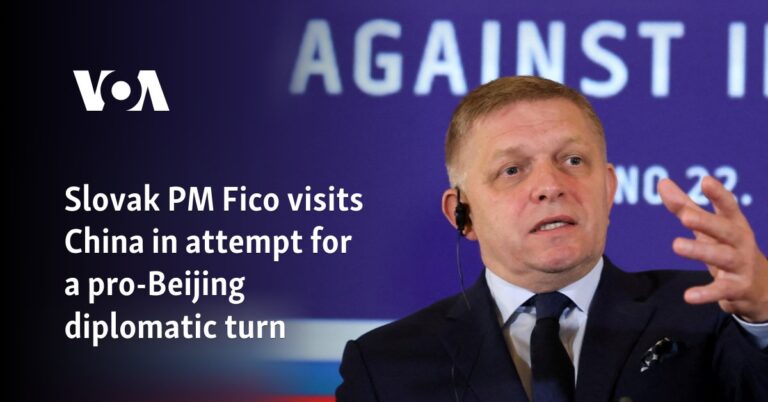Slovak Prime Minister Robert Fico begins a six-day visit to China on Thursday that will include talks with Chinese leader Xi Jinping, with stops in the central city of Hefei and Shanghai to attend the opening ceremony of this year’s China International Import Expo.
Analysts say China will use the visit to strengthen ties with the Slovak prime minister, an ally of Viktor Orbán who, like the Hungarian leader, has criticized Russian sanctions and the EU’s support for Ukraine. He is thinking of connecting this to the future.
Since taking power, Fico has focused on a more pro-China foreign policy. A visit to China scheduled for June was canceled due to an assassination attempt in May and has not materialized to date.
Fico is the longest-serving prime minister of the Slovak Republic since its founding in 1993.
Since first becoming president in 2006, Fico has resigned twice, from 2010 to 2012 and from 2018 to 2023. In 2018, due to the political crisis triggered by the murder of an investigative journalist, he resigned to make way for political ally Peter Pellegrini. Jan Kuciak.
After Pellegrini’s defeat in the 2020 parliamentary elections, the Ordinary People’s Party and the Independent Persons Party formed a new coalition government. During this period, Slovakia pursued a more pro-Taiwan and values-oriented diplomatic path, which drew opposition from Beijing.
Fico won again in the 2023 parliamentary elections and returned to power.
Fico’s administration advocates an “all-round” foreign policy, including strengthening cooperation with Russia and China. In addition to visiting China this year, Fico plans to visit Russia next year to attend the 80th anniversary commemoration of the end of World War II.
Matej Šimarczyk, executive director of the Institute of Central Europe and Asia, told VOA that the so-called “all-round” foreign policy is a euphemism for “entering economic relations with any country without taking any political values into account. He said that it means “thing”. Human rights and security considerations. ”
“The Fico government has also significantly reduced the scope of its interactions with Taiwan, and some of his closest political allies are full-fledged supporters of China,” Szymartzyk said. [China’s] Interpretation of the “One China Principle” that states that Taiwan is an inseparable part of China.
“Fico has declared many times that he does not want ‘Brussels’ to dictate to Slovakia on these issues, and for him that is his position,” said Filip Šebok, director of the Prague office of the Central Europe and Asia Institute. It is a means of increasing the Qualified to lead a “sovereign” Slovak foreign policy, despite criticism.
“In fact, domestically it is good for Mr. Fico to claim that he is doing something contrary to the Western mainstream because it allows him to maintain support with voters. It is also a way of distinguishing itself from the previous administration, which was somewhat hawkish.
Analysts believe that Fico’s visit to China also has an economic purpose.
Pavel Havlicek, a researcher at the Institute of International Affairs, said Fico is seeking partnerships and investments from countries outside Europe.
“Russia and China have a special place in this, as was repeatedly mentioned, for example, when referring to the Slovak government’s plans to restore economic relations with Russia after the war.
“In the case of China, the Slovak government is also considering investments and stronger ties to make up for the lack of economic growth.”
Šebok said the Slovak government is committed to increasing its focus on supporting economic engagement, including developing Slovak exporters and attracting investment to Slovakia.
“For example, governments have increased the number of economic diplomats around the world, opened new embassies in Asia and Africa, and opened embassies primarily as a means of strengthening economic diplomacy,” Shebok said.
“From this perspective, China is positioned as a major economic partner, and Fico will lead a relatively large business delegation to China. thinking [public private partnership] “Transportation infrastructure reconstruction and construction projects across the country”
Fico plans to work with China to advance major infrastructure projects in Slovakia, including rebuilding roads and bridges, expanding the railway between the capital Bratislava and the city of Komarno, completing the Bratislava motorway bypass and building a railway. Hydroelectric power plant.
In a recent vote on European tariffs on Chinese-made electric cars, the Fico government voted against them.
“Slovakia exports a large number of cars to China through Volkswagen factories,” Šebok said. “China is particularly exposed to Chinese retaliation against EU tariffs on Chinese EV imports, as it has directly indicated that it may target EU heavy-engine vehicles exported from Germany and Slovakia.
“Paradoxically, tariffs on Chinese EVs could actually indirectly benefit Slovakia as well, encouraging more Chinese EV producers to manufacture in Europe as a way to avoid tariffs.” “This is because we can encourage them to set up bases,” he added.
Adrianna Zhang contributed to this report.

